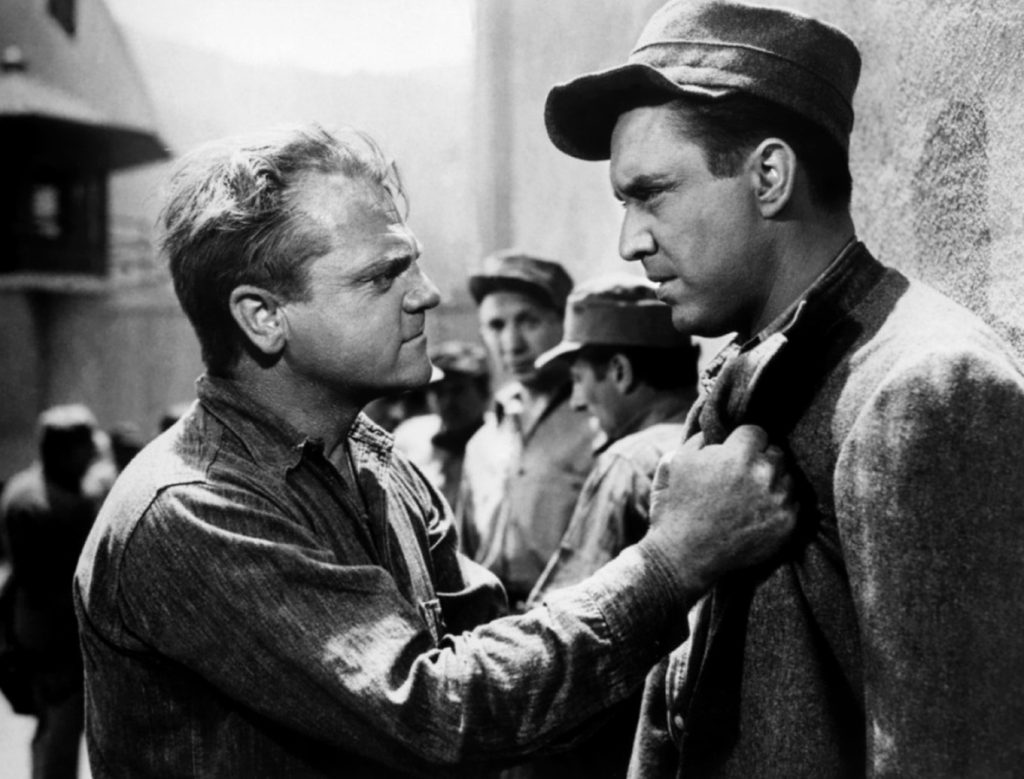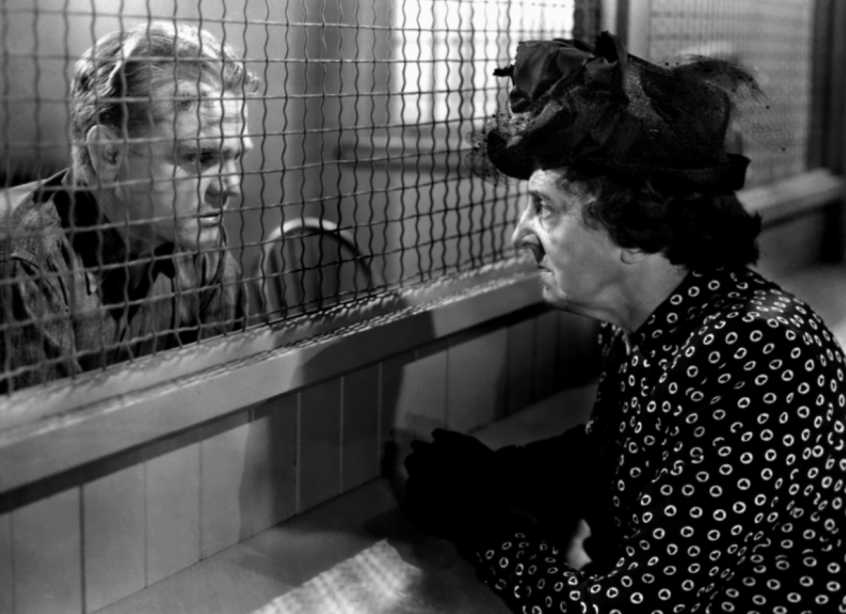
This post is a (very late) entry in the Great Villain Blogathon, hosted by Shadows and Satin, Speakeasy and Silver Screenings. See the other posts here.
I’ve decided to try something a little different for this post: not a review but a look at a single performance. (Spoilers ahead.)
Some villains have chainsaws, others vats of acid or a length of rope. In White Heat, Cody Jarrett (James Cagney) has a chicken leg. A gun too, several, but also a chicken leg.
Halfway through the film Jarrett, a homicidal criminal and the subject of a manhunt, stops for a bite to eat. Gnawing on a chicken leg, he saunters over to a parked car: a criminal with more greed than sense tried to cross him and now Jarrett has him locked up in the boot. Jarrett asks him how he is; apparently, it’s stuffy in there. So Jarrett amiably tells him he’ll let in a little air—and perforates the car with bullet holes. Then he tosses the bone away and leaves.
James Cagney packs more casual cruelty into that gesture than most actors could with a kennel full of dogs to kick.
White Heat stars Cagney as Jarrett, a thug so vicious he terrifies even members of his own gang. Violence is his favourite form of communication. When the police close in after a particularly bloody heist, Jarrett simply confesses to another, lesser crime he didn’t commit and leaves his gang—including his wife Verna (Virginia Mayo) and henchman Big Ed (Steve Cochran)—under the watchful eye of his mother (Margaret Wycherly). Jarrett expects to sail through his jail sentence. But the FBI has planted an undercover agent, Hank Fallon alias ‘Vic Pardo’ (Edmond O’Brien), in his cell. And on the outside, Big Ed has plans.
The film revolves around Cagney, an actor so fierce and vital he could grab the most mediocre movie by the scruff of its neck and wrestle it into something compelling. In White Heat he’s incendiary; it’s a wonder his co-stars don’t reach for a fire screen. Take the scene where Jarrett rushes back to his hideout and finds Verna standing on a stool in front of a mirror, admiring herself in a fur coat. His mother has gone out, and at the worst possible moment: the police are on his trail. Worried, he paces back and forth and asks why she took such a risk. Verna sneers that Ma Jarrett just had to get some strawberries as a present “for her boy”. The barb hits home. Jarrett looks slowly up at her, enraged, and then kicks the stool out from under her feet, an act of savagery which takes both Verna and the audience by surprise. Cody is monstrous, yet Cagney understands that no villain thinks he’s the bad guy. Instead he plays him as the brute sees himself: ruthless, streetwise, tough.
Jarrett is vicious; he is also unequivocally insane. A classic psychopath, he is nevertheless capable of a twisted form of love, if only for a single person: Cody agrees with Norman Bates that a boy’s best friend is his mother. Ma Jarrett is the only member of his gang he trusts, the only person in his life that matters.
The fixation is mutual. Our first hint at how deep it runs comes after the train heist, when Jarrett’s perfectly lucid mockery of Big Ed (he isn’t blind to his henchman’s ambitions) is suddenly interrupted by an anguished moan. Jarrett falls from his chair and staggers into the bedroom next door, followed anxiously by Ma, who finds him hunched over in a corner. Cagney pounds his fist on the bed like a tormented child. Jarrett suffers from debilitating headaches which erupt without warning, the pain a physical manifestation of his madness. Mother makes it better, soothing him and gently advising him not to go back out until he’s fully recovered. He can’t afford to show any weakness in front of his crew. Sitting in Ma’s lap, Cagney shows Jarrett at his most vulnerable. He seems almost human, which makes his brutality all the more disturbing.
Unsurprisingly, news that his mother has been killed triggers a breakdown. Cagney slowly rises, and then slams his cup onto the prison canteen table with a strangled cry, screaming and clawing at the inmates on either side of him. It’s the actor at his most theroid, a terrifying explosion of primordial grief and rage he performs with his entire being.
When Cody Jarrett finally goes up in an inferno he seems to be returning from whence he came. What makes this monster so compelling isn’t just the madness or the violence or the twisted humour, it’s that not a single line feels false or forced. Cagney’s sincerity makes Jarrett terrifying, and terrifyingly real.

You said it! I completely agree: James Cagney’s sincerity makes Jarrett terrifying. Cagney gives a pitch-perfect performance here. Never once does he slip out of character, and it makes him mesmerizing.
I liked how you described that scene with the chicken leg. Such casual cruelty. The first time you see it, you think: Did he just do that?
Thanks for joining the blogathon. Your analysis was definitely worth the wait. 🙂
Thank you so much!